When NASA’s Perseverance rover touched down on the surface of Mars on Thursday after a seven-month journey, a Taiwan-born engineer was preparing to guide its first movements on the Red Planet.
Yen Cheng (嚴正), a 61-year-old graduate of National Tsing Hua University and a 20-year veteran at NASA’s Jet Propulsion Laboratory, is taking part in his fourth Mars exploration mission with the agency’s Robot Interfaces and Visualization team, this time as its leader.
Yen in a media interview described his expectations for the next few months as “living on Earth in Mars time.”

Photo: Reuters/NASA/JPL-Caltech
As nighttime temperatures on Mars can drop to minus-80°C, the rover must spend those periods heating itself, while conducting research during the day, he said.
Yen and his team would use the downtime to prepare the code that would guide the rover’s movements the next day, he said.
However, as a Martian day is about 40 minutes longer than an Earth day, the time difference results in a shifting work schedule.
“Today my shift started at 2pm. Next week it will start at 10pm,” Yen said.
He said that piloting the 1-tonne rover is nothing like driving a remote-controlled vehicle, despite expectations to the contrary.
As there is no GPS on Mars, Yen and his team had to design custom navigation software for the rover, using technologies such as 3D visualization and virtual and augmented reality.
These efforts, multiplied across other teams contributing to the mission, mean that every meter the rover covers on Mars is the product of “decades of work by countless people,” he said.
One of the main missions of the Perseverance rover is to search for signs of ancient life on the Red Planet.
Asked if NASA has guidelines on what to do if the rover encounters alien life, Yen said it did not, but joked that his first instinct would be to take a picture.
However, NASA followed strict procedures to prevent Earth organisms from hitching a ride to Mars, due to their potential to corrupt scientific research and result in a false discovery of life on the Red Planet.
Asked how long it would take before a human mission could reach Mars, Yen said he believes that children born this year could see it during their lifetime, adding that the technology needed to launch a human mission to Mars already exists.
It is just a matter of investing the money, which would be “hundreds of times” more than the US$2.7 billion price tag for the Perseverance mission, he added.
While the goal remains distant, Yen said he was amazed by the progress that has been achieved during his own time at NASA, including the discovery that liquid water once existed on Mars and now searching for evidence of life on the Red Planet.
Yen advised young Taiwanese interested in astronautics not to be afraid to pursue their dreams, citing his own mid-career decision to leave a professorship for an opportunity at NASA.

Trips for more than 100,000 international and domestic air travelers could be disrupted as China launches a military exercise around Taiwan today, Taiwan’s Civil Aviation Administration (CAA) said yesterday. The exercise could affect nearly 900 flights scheduled to enter the Taipei Flight Information Region (FIR) during the exercise window, it added. A notice issued by the Chinese Civil Aviation Administration showed there would be seven temporary zones around the Taiwan Strait which would be used for live-fire exercises, lasting from 8am to 6pm today. All aircraft are prohibited from entering during exercise, it says. Taipei FIR has 14 international air routes and

Taiwan lacks effective and cost-efficient armaments to intercept rockets, making the planned “T-Dome” interception system necessary, two experts said on Tuesday. The concerns were raised after China’s military fired two waves of rockets during live-fire drills around Taiwan on Tuesday, part of two-day exercises code-named “Justice Mission 2025.” The first wave involved 17 rockets launched at 9am from Pingtan in China’s Fujian Province, according to Lieutenant General Hsieh Jih-sheng (謝日升) of the Office of the Deputy Chief of the General Staff for Intelligence at the Ministry of National Defense. Those rockets landed 70 nautical miles (129.6km) northeast of Keelung without flying over Taiwan,

The Ministry of National Defense (MND) today released images of the military tracking China’s People's Liberation Army (PLA) movements during the latest round of Chinese drills around Taiwan. The PLA began "Justice Mission 2025" drills today, carrying out live-fire drills, simulated strikes on land and maritime targets, and exercises to blockade the nation's main ports. The exercises are to continue tomorrow, with the PLA announcing sea and air space restrictions for five zones around Taiwan for 10 hours starting from 8:30am. The ministry today released images showing a Chinese J-16 fighter jet tracked by a F-16V Block 20 jet and the

City buses in Taipei and New Taipei City, as well as the Taipei MRT, would on Saturday begin accepting QR code payments from five electronic payment providers, the Taipei Department of Transportation said yesterday. The new option would allow passengers to use the “transportation QR code” feature from EasyWallet, iPass Money, iCash Pay, Jkopay or PXPay Plus. Passengers should open their preferred electronic payment app, select the “transportation code” — not the regular payment code — unlock it, and scan the code at ticket readers or gates, General Planning Division Director-General Liu Kuo-chu (劉國著) said. People should move through the